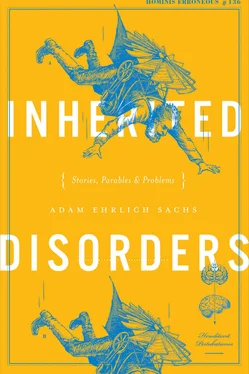A policeman later caught him trying to stuff his father’s admirably pragmatic attitude toward death and life into a Goodwill donation box. Dispositions, the son pointed out, were not featured on the list of unacceptable items. It is not a hazardous chemical, he said. It’s not paint, solvent, or oil. It’s not a mattress! It’s not a box spring! It is an outlook or standpoint . Not unkindly, the policeman showed him that while standpoints did not appear on the list of unacceptable items, nor were they on the list of accepted items. Why, asked the policeman, not unkindly, if it’s so good, don’t you want to keep it for yourself? Or is that getting into complicated territory? And the son said, Yeah, kind of getting into complicated territory there.
Happily, the son did find, eventually, a small charity that would accept discarded mental attributes. They took everything of the father’s apart from his arachnophobia and his love of family —both of which they had in surplus — and his moral righteousness , which was unusual but too idiosyncratic, they said, to find a good home for. Surprisingly, they were willing to take his casual interest in jazz, his elementary knowledge of military history, his feelings about small dogs versus big dogs , his impatience with organizations, his disdain for metaphysics , and even his vague childhood memory of visit to unidentified lake. Apparently there is now a village in the West African Sahel whose residents have been able to put his father’s mental things to good use. The charity does a really nice job. Once a year the son gets an update about the villagers: Mariam has taken out a microloan with the aid of your father’s numeracy . Ibrahima has started a small crafts business using your father’s self-confidence . Youssouf is now planning to become a soil scientist thanks to your father’s idea of what constitutes worthwhile work .
24: THE FURNITURE STORE OWNER’S SON
…………………….
In Vilnius, around the turn of the twentieth century, an assimilated Jewish businessman who owned a thriving furniture store was stunned and profoundly disturbed to learn that his relationship with his son, which was tense in the usual ways but by no means unloving, had been converted — by the son — into a theory of history, society, eschatology, art, the novel, and politics. This was, of course, the period during which artistic and intellectual Jews all across Europe were busily converting the particulars of their relationships with their recently assimilated businessman fathers into art of supposedly universal significance and ideas of supposedly universal application. But the furniture store owner was unfamiliar with these works. When he came across his son’s book, in which he and his sofas, beds, and hardwood chairs and his (always well-meaning) efforts to introduce his son to the furniture trade were made to represent more or less the whole cosmos, the march of human history, and the form of the bourgeois novel, he was devastated.
He summoned his son to the furniture store.
“Is this,” he asked, holding up the book, which he had hardly understood, “really what you think of me?”
Yet the son was already transposing the particulars of this conversation, their last of any substance, into a universal key.
…………………….
The son of the late philosopher-mystic Perelmann, who was writing a biography of his father, used to say at our weekly brown bag colloquiums that he wore two hats: that of Perelmann’s son and that of his biographer. We assumed that this was just a figure of speech until a graduate student who happened to be renting an apartment across the street from him reported that he really wore two physical hats : the son-of-Perelmann hat was a Boston Red Sox cap and the biographer-of-Perelmann hat was a brown fedora. Some evenings he wore the Red Sox cap, some evenings he wore the brown fedora, and some evenings he went back and forth, more or less rapidly, between the cap and the fedora.
Word circulated, and before long the chair of the department knocked on Perelmann’s son’s office door. The chair urged him to take some time off, please, for his own sake.
“Bill,” said Perelmann’s son with a knowing smile. “Is this about the hats?”
The chair admitted that he was concerned.
“Bill,” said Perelmann’s son again, touching the chair’s wrist. “Don’t worry about me. I’m not going crazy, at least not yet! The hats serve a purely functional purpose.”
It looked silly, he knew, but the hats helped him keep separate his two conflicting roles — first as a son still grieving for his dad, second as a scholar trying to understand, to historicize, and, yes, to critique, as dispassionately as possible, his father’s ideas. Before hitting upon the two-hat system, he’d lived in a state of perpetual self-reproach: when he thought of Perelmann the way a son thinks of his dad, the scholar in him condemned his lack of objectivity, and when he thought of Perelmann the way a scholar thinks of his subject, the son in him condemned his lack of loyalty.
The hats put an end to all that.
When he pulled on the old Red Sox cap, its snug fit and familiar smell had a Proustian effect. He was returned to the grandstands of Fenway Park, beside his father. He was suffused with compassion and pity, with respect, love, and acceptance — for his father’s flaws no less than for his virtues. He wanted to annihilate his father’s academic detractors and slaughter those who would attempt to understand him as a product of his milieu. Such was the effect of the Red Sox cap. But under the weight of the brown fedora, beneath its sober brim, he could put aside his childish devotion and scrutinize his father’s thought with the skepticism required of an intellectual historian. He investigated the genealogy of his father’s ideas, examined their internal consistency, considered their presuppositions and limitations.
“Bill, I admit it’s a strange system!” said Perelmann’s son, laughing. “That what happens in our heads should be so affected by what happens on top of our heads. But for me, this does seem to be the case.” He shrugged. “It helps me proceed. I do not question it.”
The department chair went away intensely impressed, even moved. Word went forth that Perelmann’s son was not crazy, but brilliant.
At our next brown bag colloquium, Perelmann’s son claimed to wear “four hats.” He was Perelmann’s son, Perelmann’s biographer, Perelmann’s philosophical interlocutor, and Perelmann’s estate executor.
The next morning the graduate student reported that two new hats, a black bowler and a purple yarmulke, had entered the rotation. From what he’d seen, he hypothesized that the bowler was the executor hat and the yarmulke was the interlocutor hat. Perelmann’s son had spent most of the early evening going calmly back and forth between the Red Sox cap and the bowler. At around eight o’clock the yarmulke went on and stayed on until just after nine. From then until midnight, he frantically switched between the yarmulke, the Red Sox cap, and the brown fedora. He ended the night with forty-five relatively relaxed minutes in the black bowler.
“I’m fine, Bill!” said Perelmann’s son, touching the chair’s wrist. “How can I summon memories of my father one minute, and deal with his taxes the next? Impossible, unless I physically put on the bowler hat . One minute I’m recalling the sensation of being up on his shoulders, the next I’m attacking his peculiar interpretation of Kant? The purple yarmulke . Who taught him this idiosyncratic Kant, and when? Brown fedora .”
Читать дальше












